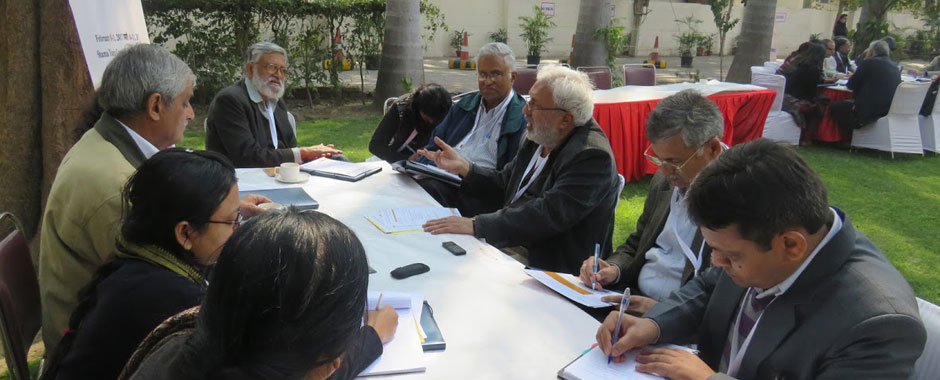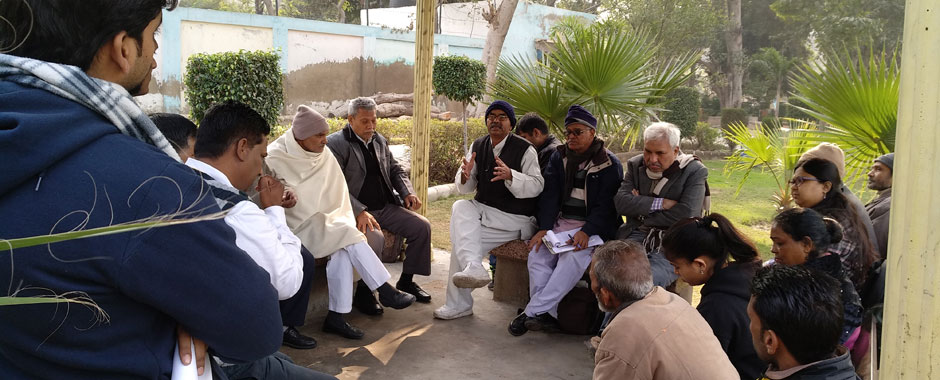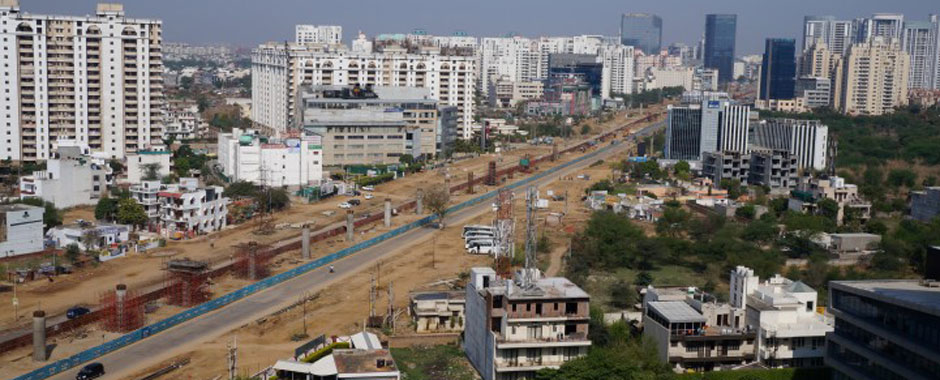by Dinesh Abrol, Pravin Kushwaha and Bikramaditya K. Choudhary, South Asia Sustainability Hub & Knowledge Network.
As big cities change rapidly, people moving into them can struggle for access to basic services like clean water and sanitation. One such city is Gurgaon, a secondary city that’s experienced rapid urban transition over the last two decades. To the southwest end of Delhi in the national capital region (NCR) of India, Gurgaon has seen a rapidly-growing influx of working-class and middle-class migrants.
Gurgaon is a popular destination, near an international airport, with plenty of office space, shopping malls and a Cyber Hub, with a Rapid Metro connecting Cyber City, Udyog Vihar and DLF Phase III, where most offices are located.
But in a semi-arid region, unsustainable growth and development have exacerbated Gurgaon’s water problems. The city’s urban and peri-urban areas rely on diminishing supplies of groundwater; access to sanitation is unequal, and water in poorer areas is polluted. Working-class migrants to Gurgaon have to struggle with the failures of the urban water system on an everyday basis.
Practices followed for urban planning and governance do not focus on protecting of catchment areas and natural drainage, or the proper treatment, recycling and reuse of waste water. And there is a lack of leadership and support for ordinary citizens to exercise their rights in the way water and sanitation are governed.
To tackle this problem, a T-Lab (Transformation Lab) was set up in Gurgaon. T-Labs are a highly-facilitated process, involving research, workshops and other forms of engagement. They’re designed to unblock complex, intractable problems (like that of growing vulnerability in the water management system) and find alternate ecologically sound and socially just solutions.
The Gurgaon T-Lab, convened by the Transdisciplinary Research Cluster on Sustainability Studies (TRCSS) at Jawaharlal Nehru University, is one of six T-Labs run by the Pathways Network in sites around the world.
A new forum for Gurgaon
Through the research and discussions in the T-Lab, participants from academia, policy and citizens’ groups established the Gurgaon Water Forum (GWF) – a multi-stakeholder knowledge sharing platform that brings together several linked initiatives.
Some of the leading institutions in the National Capital Region, such as Jamia Millia Islamia University, the Indian Institute of Technology, the National Institute of Urban Affairs, the School of Planning and Architecture and Jawaharlal Nehru University are actively contributing to the development of these initiatives.
A vast majority of these initiatives are focused on generating and sharing knowledge. To do this, they have aimed to bring together trade unions, resident welfare associations, women groups, environmentalists, urban planners, architects, engineers and citizens on a common platform.

This platform – currently led by TRCSS, JNU – has allowed the sharing of expertise in several vital areas related to water: rainwater harvesting, protection and regeneration of water bodies, prevention of urban flooding and water logging, provision, access and use, treatment and reuse, and drainage and sanitation.
The knowledge shared is now being implemented in how technology is being used and adapted in Gurgaon. This weekend, the GWF will hold an exhibition and social forum (view the programme) to discuss progress and challenges.
Forming alliances
This process is not easy. Participants in the GWF believe that the struggle to transform Gurgaon’s urban water system will be rather long, difficult and challenging. Because of this, the GWF is trying to forge durable alliances for the long struggle ahead, by bringing together organizations working with the middle classes, as well as the marginalized working-class sections of the city.
The GWF is also investing considerable time in documenting and analyzing the outcomes and impacts of its citizen science, dialogue, advocacy, participation and real world experiments.

The GWF aims to measure its success on two fronts: firstly, by visible signs of a shared understanding of the problem; and secondly by the extent to which a new Collective Practical Understanding (CPU) is embedded, which contributes to the widening and deepening of spaces for the achievement of ecological and social justice for the working people of Gurgaon.
Over the months and years that follow, the GWF will be assessing the progress made in re-configuring urban spaces, reconfiguring urban governance, growing civic empowerment and creating new pathways for integrated water resource management in Gurgaon.
Real world experiments
The GWF’s vision for the T-lab process is as a multi-stakeholder platform that goes beyond the conventional repertoire of dialogue, advocacy and participation. Real-world experiments have begun to build the ‘social carriers’ of innovation for the reconfiguration of Gurgaon’s urban water system.
Masons and plumbers have been trained in the construction, repair and maintenance of rainwater harvesting structures by the civil engineering department of Jamia Millia Islamia to work in the field as a group enterprise.
Similar programs are in the pipeline for the training of workers in reedbed technology at IIT Delhi, and in solid waste management in Jamia Millia Islamia. Volunteers have been trained in the testing of water quality and a survey of close to twenty settlements has been accomplished.
The GWF has also mobilized volunteers from the trade unions, non-governmental organizations working on science education, environmental and health advocacy, architects, team trained in the use of GIS, resident welfare organizations to act as a System Design Group (SDG). The scaffolding of a Network System of Solution Implementation (NSSI) now exists to tackle the challenges of transforming the urban water system. New knowledge, values and institutions are gradually making headway.
Communication
Public outreach has also been an important part of the forum’s aims. Today the GWF has a series of programmes of mass communication taking place through community radio, citizen journalists, citizen science and citizen alerts and grievance redressal. These include the active cooperation of close to fifty activists, enrolled from among the women, students and workers associated with the members of mobilized public groups.
These activists have a shared understanding of the problem. They have also begun to deal with the challenge of developing a new collective practical understanding, in order to transform urban spaces currently shaped by neoliberal processes of development and private ownership.
The authors work on the India case study of the Pathways Network, which uses Transformation Labs to address social-ecological problems in six sites around the world.
